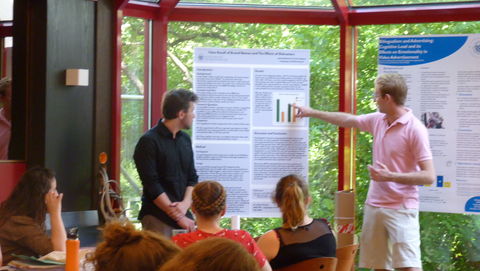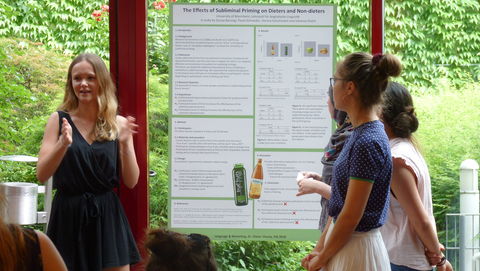MaKuWi Anglistik: Example Courses
What kind of courses can I take at the Department of English?

You study Linguistics, Literature and Cultural Studies with us. Here, are some examples of the courses we offer.
Linguistics: Language and Marketing II
 Bild: Dieter Thoma
Bild: Dieter ThomaStudents at the 2018 poster conference Marketing communication and research heavily rely on language. In advertising, for example, language can trigger emotions, explain product benefits and to persuade consumers to buy a certain product. Obviously, the success of such marketing efforts depends on linguistic and psycholinguistic processes.
In this course, students acquire basic knowledge in central areas of psycholinguistics and marketing communication. They learn to recognize how linguistics structures chosen for persuasive communication can affect consumer behavior. The practical aim is that students can apply this new knowledge analytically and constructively to solve authentic marketing problems. Therefore, we do case studies, where we design new brand names, non-profit and crowed-funding campaigns. As a major task, students conduct their own research project and present their results at a poster conference.
Literary Studies: Climate Change Fiction
 Bild: Cornelia Lahmann
Bild: Cornelia LahmannSince the 1990s a new genre has been emerging in Anglophone literature called climate change fiction. These texts imaginatively create a world in which anthropogenic climate change has radically altered the social, political, and cultural environment as we know it today. Often written in the dystopian mode, they depict the consequences of climate collapse as a catastrophe. Other novels (or films) which are not set in the future reflect the present anticipation of catastrophe still hoping to show a way out of the impending disaster.
In this seminar we will read several climate change novels and possibly view at least one film and interpret them with the help of social risk theories. We will define the new nature of risk in a time of large-scale ecological changes and we will especially deal with the question how narrative contributes to the climate change debate and discuss its cultural function.Business Communication III
 Bild: Lara Wörner
Bild: Lara WörnerThis course concentrates on one of the most important and challenging areas of business communication – persuasion. It explores various, practical aspects of marketing products, institutions and ideas. At the beginning of the semester, students select a mission-centric institution which appeals to them. Over the course of the semester, a market analysis is carried out and a marketing strategy is developed for this institution. Ideas are generated to further develop the brand and achieve specific marketing goals.